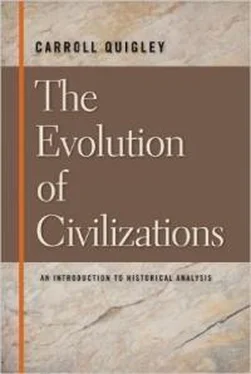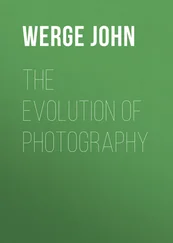At the present time it is too early to judge if the present crisis of Western civilization will resolve itself into a new, fourth Age of Expansion, or will continue through an Age of Conflict to a universal empire and ultimately to decay and invasion.
In any case the immediate future seems to offer to Western society a culture in which, on various levels, an army of specialists serves an ideological state, supported by a pluralist economy regulated by planning (both public and private)
in a society in which the dominant social class is made up of managers (rather than owners, bankers, voters, or others). In this culture the nature of the intellectual and religious levels will depend on whether the whole system continues in a period of conflict or turns toward a new Age of Expansion.
Conclusion
What is the point of all this? Looking back over our discussion, it seems to me that at least six chief points readily emerge.
In the first place, I have sought to emphasize the difference between knowledge and understanding in the field of history. To know is not too demanding: it merely requires memory and time. But to understand is quite a different matter: it requires intellectual ability and training, a self-conscious awareness of what one is doing, experience in techniques of analysis and synthesis, and above all, perspective. Moreover, perspective requires a familiarity with the units of social aggregations and a recognition that understanding can be achieved only if we tackle societies and that it cannot be reached if we try to deal with social groups determined by geographic areas, political units, religion, nations (linguistic or "cultural"), or by intellectual categories such as veterans or middle class. To obtain knowledge we must use such groups, but to obtain understanding we must use the only group that is comprehensible: the society.
There is nothing very original in this first point, since it is, among others, advocated by Toynbee in the first volume of his A Study of History, but it has not been accepted by historians, who, in practice, continue to deal with noncomprehensible units such as states or nations. Moreover, Toynbee never defined his terms, and constantly violated his own precepts in his own practice.
The second major point is the recognition that civilizations pass through a process of rise and fall. This is, of course, one of the oldest cliches in any "philosophy of history," and no claims to originality on that score could be made for this present book. But I have sought to go beyond the mere recognition of "rise and fall" to seek to find the mechanism of the process. Here I do not feel entitled to make any claim to startling originality because the process I describe—the institutionalization of social instruments—is clearly what was at the back of the minds of a number of earlier writers on the philosophy of history. I have sought to make the process explicit, so that it can be recognized and analyzed more readily and so that turning points in the process can be established with greater confidence. At the same time I have given, I hope, sufficient warning that this process is neither rigid nor single in any society, but rather that each civilization is a confused congeries of such processes in all types of human activities and that the explicit recognition or description of one such organization as the independent factor in a medley of mutually dependent factors is not a description of the reality (which is far too complex for any historian to describe it adequately), but is a technique for dealing with an irrational process similar to that used by a mathematician who deals with the irrationality of change by the use of a calculus based on untrue assumptions involving finite increments or on an assumed distinction between an independent variable and dependent variables. For the historian, as for the mathematician, I should advise that the chief task must not be a vain search for the factor that is independent but an explicit recognition that we are assuming the independence of one variable.
A third conclusion, derived from the second, is concerned with periodization in history. It has been clear for a long time that the periodizations now used are unsatisfactory. The division of ancient history into a Greek period, a Hellenistic period, and a Roman period makes no sense at all, can be maintained only by making the second period (connecting two linguistic divisions) vague and undefined, and clearly requires numerous violations of chronological order. Attempts have been made to get around these weaknesses in the customary division by efforts, such as Sanford's (in a textbook) to divide the Classical world into several geographic areas that advance chronologically side by side; these have been far from successful. In European history the same problem of periodization has been causing even greater dissatisfaction. The existing division into medieval, Renaissance, modern, and contemporary history has pleased no one (and has been most displeasing to the specialists on the Renaissance), but no substitute for these long-established divisions has been found. The greatest problem has arisen in the Renaissance period because of its wholly ambiguous relationship to the medieval period, a relationship that remains ambiguous because of the mistaken effort to treat the Middle Ages as a single period. As a consequence, we find medieval history, to nonmedievalists, represented by a welter of contradictions called "renaissance of the twelfth century," "Age of Authority" (or Faith), "Dark Ages," and other totally misleading verbal tags. My division of the millennium 400-1400 into the four stages of Mixture, Gestation, Expansion, and Conflict solves many of these difficulties, provides tools with which to analyze aberrations like the Carolingian revival, and, above all, provides a vocabulary for dealing with the problem.
On the whole, the division into seven stages is largely my own except that I have used Toynbee's ideas, if not his nomenclature, with reference to the last four or five stages. The great advantage that my seven stages provides over Toynbee's recognition of the last five of them rests in my insistence that any division into stages must be based on analysis of the process of "rise and fall" that is being discussed. It is not sufficient merely to describe and to devise name tags for stages based on such description. This is what Toynbee has done, and this is why Toynbee is so notably unsatisfactory in dealing with the earlier stages of any civilization's evolution. Toynbee's process of "Challenge and Response" explains nothing, is based on a mistaken Darwinian biological analogy, and provides no technique for analyzing a society or for communication with others about it. It is true that societies are challenged and either do or do not respond to these challenges. This is so true as to be quite unhelpful. The important point is why a society responds or fails to respond, how we can judge the likelihood of either beforehand, and what is the consequence of either alternative. Moreover, Toynbee's failure, already sufficiently emphasized, to correlate his process with his division into stages is a major weakness.
Toynbee's failure to provide a satisfactory analysis of process explains his failure to understand, or to provide stages for, the first part of a civilization's existence. The whole process of mixture, gestation, and incipient expansion is of vital concern to us today when the buffer fringe between the Western and the Soviet blocs, from Morocco to Indonesia, offers a real challenge in this very regard. Here Toynbee has almost nothing to offer, either to the peoples of those areas who are struggling to establish viable societies or to us who are trying to understand what is happening there.
A fifth contribution I have tried to make is concerned with vocabulary. This contribution has two parts. On the one hand, I have tried to provide a vocabulary sufficiently well-defined to allow communication between students of these problems, yet sufficiently realistic to assist explanations of what is happening or did happen in any society. On the other hand, (and this is a major point), I have tried to establish some degree of sophistication in the use of historical vocabulary so that awareness of the subjective nature of most intellectual categories dealing with historical facts will be maintained. I am sure that my vocabulary is far from perfect; this is inevitable. The real point is that my vocabulary is fruitful: fruitful in research projects, in arousing original questions and interpretations, and in making communication between historians more helpful. No vocabulary is perfect; like everything else it is an instrument that becomes an institution, serving eventually to hamper thought and communication about these important matters. When that occurs, the old vocabulary of cliches must be circumvented or reformed. As it is now, the vocabulary of periodization and the vocabulary of analysis (by aspects or "levels") hamper historical understanding, particularly by encouraging specialization, either by period or by subject, in areas that are unreal, defunct, and much too narrow. The best histories of the future will emerge from work that straddles the older, obsolete, and unrealistic boundary lines.
Читать дальше










